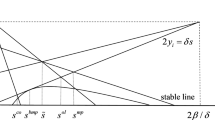Abstract
In this paper, we investigate the Merton portfolio management problem in the context of non-exponential discounting. This gives rise to time-inconsistency of the decision-maker. If the decision-maker at time t = 0 can commit her successors, she can choose the policy that is optimal from her point of view, and constrain the others to abide by it, although they do not see it as optimal for them. If there is no commitment mechanism, one must seek a subgame-perfect equilibrium policy between the successive decision-makers. In the line of the earlier work by Ekeland and Lazrak (Preprint, 2006) we give a precise definition of equilibrium policies in the context of the portfolio management problem, with finite horizon. We characterize them by a system of partial differential equations, and establish their existence in the case of CRRA utility. An explicit solution is provided for the case of logarithmic utility. We also investigate the infinite-horizon case and provide two different equilibrium policies for CRRA utility (in contrast with the case of exponential discounting, where there is only one optimal policy). Some of our results are proved under the assumption that the discount function h(t) is a linear combination of two exponentials, or is the product of an exponential by a linear function.
Similar content being viewed by others
References
Ainslie G.W.: Picoeconomics. Cambridge University Press, London (1992)
Barro R.J.: Ramsey meets laibson in the neoclassical growth model. Q. J. Econ. 114, 1125–1152 (1999)
Cox J.C., Huang C.H.: Optimal consumption and portfolio policies when asset prices follow a diffusion process. J. Econ. Theory 49, 33–83 (1989)
Ekeland, I., Lazrak, A.: Being serious about non-commitment: subgame perfect equilibrium in continuous time. Preprint (2006)
Goldman S.M.: Consistent plans. Rev. Financ. Stud. 47, 533–537 (1980)
Karatzas I., Lehoczky J.P., Shreve S.E.: Optimal portfolio and consumption decisions for a small investor, on a finite horizon. SIAM J. Control Optim. 25, 1557–1586 (1987)
Krusell P., Smith A.: Consumption and savings decisions with quasi-geometric discounting. Econometrica 71, 365–375 (2003)
Loewenstein G., Prelec D.: Anomalies in intertemporal choice; evidence and an interpretation. Q. J. Econ. 107, 573–597 (1992)
Laibson D.: Golden eggs and hyperbolic discounting. Q. J. Econ. 112, 443–477 (1997)
Merton R.C.: Lifetime portfolio selection under uncertainty: the continuous-time case. Rev. Econ. Statist. 51, 247–257 (1969)
Merton R.C.: Optimum consumption and portfolio rules in a continuous-time model. J. Econ. Theory 3, 373–413 (1971)
Mbodji, O.: Numerical analysis of a nonlinear integral equation. Dissertation, University of Nice (2008)
Peleg B., Menahem E.Y.: On the existence of a Consistent Course of Action when Tastes are Changing. Rev. Financ. Stud. 40, 391–401 (1973)
Peng S.: A general stochastic maximum principle for optimal control problems. SIAM J. Control Optim. 28, 966–979 (1990)
Pollak R.A.: Consistent planning. Rev. Financ. Stud. 35, 185–199 (1968)
Strotz R.: Myopia and inconsistency in dynamic utility maximization. Rev. Financ. Stud. 23, 165–180 (1955)
Yong J., Zhou X.Y.: Stochastic Controls: Hamiltonian Systems and HJB Equations. Springer, Heidelberg (1999)
Author information
Authors and Affiliations
Corresponding author
Additional information
I. Ekeland was supported by PIMS under NSERC grant 298427-04.
Rights and permissions
About this article
Cite this article
Ekeland, I., Pirvu, T.A. Investment and consumption without commitment. Math Finan Econ 2, 57–86 (2008). https://doi.org/10.1007/s11579-008-0014-6
Received:
Accepted:
Published:
Issue Date:
DOI: https://doi.org/10.1007/s11579-008-0014-6




